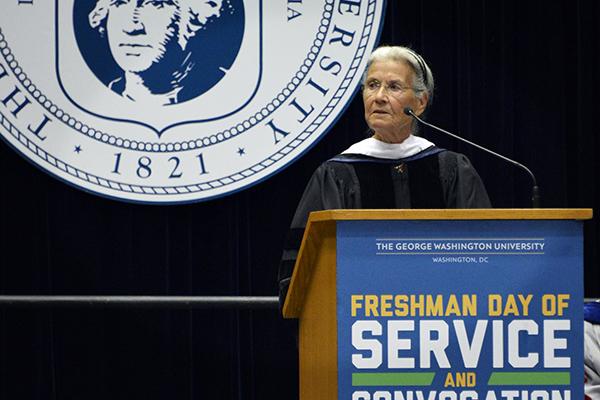Some people like to keep a low profile when donating their money.
Last weekend, an emeritus professor made a donation and renamed the Center for Civic Engagement and Public Service, but officials did not announce the donation total. The decision behind announcing a gift amount usually rests with the donor, not the school, experts say. An institution may also bow to a donor’s desires instead of trying to convince them to make the amount public, even if the announcement could lead others to pull out their checkbooks.
Aristide Collins, the vice president for development and alumni relations, said that the University’s fundraisers make their donors’ requests a priority in the giving process.
“At the donor’s request, the University will not disclose the amount of a leadership gift to GW,” he said in an email. “A request to keep a donation private is a function of the donor’s personal preference, and occasionally, donors may request that their name not be used in affiliation with a donation.”
Last weekend’s gift came from Honey W. Nashman, an emeritus professor who taught at GW for 43 years. Nashman said she hoped her gift would boost student involvement on campus and increase the number of service-learning courses.
Collins added that the development office staff focuses on “stewarding” its donors by keeping them up to date on the impact of their gifts and making sure that their money is being used in the way intended. Most gifts the University receives are restricted gifts, meaning donors decide where the money will be used.
Several fundraising experts said that listening to a donor’s wishes is just one way a school can show appreciation for the gift. Some donors may not even want the fact that they donated at all made public, experts said.
Richard Ammons, a senior consultant at the fundraising firm Marts & Lundy, said some people consider gift amounts a personal matter that shouldn’t be shared with anyone other than university officials.
“Some people would rather not give out information that might signal the size of their wealth or how much they have to give away,” Ammons said.
Alumnus Gilbert Cisneros, has publicly made two donations of more than $1 million to GW, but also gave an undisclosed amount to the Newman Catholic Student Center in 2011. He and his wife donated $7 million last spring to fund the Cisneros Leadership Institute.
Tim Winkler, the founder of the fundraising firm Winkler Group, said that “it behooves the university to honor that request” because the relationship with past donors is more important than trying to attract new gifts.
But officials often also use the announcement of large gifts to build momentum that could attract other gifts in the future. For example, when billionaire philanthropists Sumner Redstone and Michael Milken gave GW a combined $80 million in 2014, still GW’s largest-ever gift, officials hoped it would encourage others to make donations.
“Announcing the amount can leverage more and bigger gifts, but the University shouldn’t push too hard,” said Winkler.
Ryan Lasker contributed reporting.







